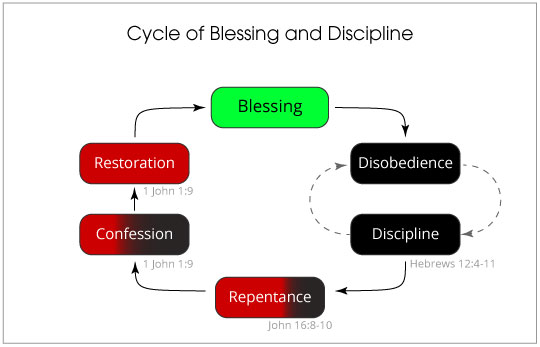Bible Question:
When reading Leviticus 26, I noticed 4 warnings of seven-fold judgments. Some commentaries connect the seven-fold judgment to the exile of 70 years and the 70 seeks of years in Daniel. It appears the 4 warnings are consecutive, not concurrent. If we apply all four warnings to the 70 year exile, we get 1960 years. Using the Jewish 360 day calculation, that comes to 1933 Gregorian years. Then add 1933 years to 33 AD when Jesus died, and that brings us to 1966. This is awfully close to when the Jews recaptured Jerusalem in 1967. Is this correct?
Bible Answer:
In Leviticus 26 God promised blessing to His chosen people, the nation of Israel, and warned them of discipline if they disobeyed. Our holy and just God established the conditions for blessing and discipline. The warning of disobedience has four parts. Each part increasingly warns that the punishment for disobedience will become worse if they continue to disobey. But does Leviticus 26 also prophesy the Jews’ return to Jerusalem in 1967?

Conditions For Blessing
In the first part of Leviticus 26 (Leviticus 26:1-13), God told the Israelites that He would bless them if they would keep the second and fourth commandments (Exodus 20:4, 8). It appears that God’s promise includes all of the commandments related to Him. That is, they will be blessed if they are committed to the only true God and keep the Sabbath. If they choose to be obedient, God promised blessings that would include: rains in the right season so that their fields and trees would produce crops (v. 4-5), peace in the land from animals and enemies (v. 6-8) and provision of food to eat. Finally, God promised that He would dwell with them if they obeyed.
Conditions For Judgment
Then God warned the Israelites that they would suffer if they disobeyed and the suffering would become worse if they continued being disobedient. God announced five separate sets of judgments. Each of the five warning sections begins with an “if.” There are also four more “if” statements in the chapter (v. 3, 15 and 37) and the last “if” occurs in verse 40, which describes God’s response if they repent and turn from their sin.
Each section starts with a warning that if they do not obey (v. 14, 18, 27), are unwilling to obey (v. 21) or will not turn to Me (v. 23), then God will punish them in some way (v. 16, 18, 21, 24, 28). At the conclusion of each of four warning sections (not the fifth warning), God announces that if they continue refusing to be obedient the punishment will increase “seven times” (v. 18, 21, 24, 28).
Each warning section is different. Each warning is worse than the last one since God warned that the next punishment would be seven times worse. God is the “adult of adults” in our lives and His goal in disciplining us when we sin is to motivate us to stop sinning and turn to Him. Therefore, if we will not respond to the initial discipline, then God increases the level of discipline until we respond or our hearts become hardened. Here are the warning sections and what each one was about. Each one describes what will happen to the Israelites if they do not repent.
Warning of Illness and Defeat (v. 14-17)
Warning of Drought and Famine (v. 18-20)
Warning of Plague and Wild Animals (v. 21-22)
Warning of Sword, Pestilence and Famine (v. 23-26)
Warning of War and Fear (v. 27-39)

Promise of Restoration
When we reach verses 40-45, God promises forgiveness and restoration to Israel if they repent and change their behavior. In verses 40-41, He says that if Israel repents and confesses their sins and the sins of their forefathers, and stops being hostile to Him, then He will stop being hostile to them. He will stop disciplining them.
Then God prophesies that the land would be abandoned to make up for the years the land did not experience a Sabbath rest.
For the land will be abandoned by them, and will make up for its sabbaths while it is made desolate without them. They, meanwhile, will be making amends for their iniquity, because they rejected My ordinances and their soul abhorred My statutes. Leviticus 26:43 (NASB)
This prophecy was fulfilled when the Assyrian Army deported the northern kingdom of Israel in 722 B.C. and the Babylonian Army invaded and deported the southern kingdom of Judah in 605 B.C. This prophecy in verse 43 reveals that Israel would be disobedient and the disciplines described in the warning sections would occur and they did.
Earlier, Leviticus 26:33-35 prophesied the invasions and the deportations of the Jews from the northern and southern kingdoms.
You, however, I will scatter among the nations and will draw out a sword after you, as your land becomes desolate and your cities become waste. Then the land will enjoy its sabbaths all the days of the desolation, while you are in your enemies’ land; then the land will rest and enjoy its sabbaths. All the days of its desolation it will observe the rest which it did not observe on your sabbaths, while you were living on it. Leviticus 26:33-35 (NASB)
The land of Israel would be unoccupied for seventy years (605 B.C. to 535 B.C.) due to their sin. This occurred because the Israelites had failed to allow the land to be dormant every seventh year (Leviticus 25:4-5, 27-46) for 490 years or seventy sabbath years (2 Chronicles 36:21; Jeremiah 34:12-22)).
Conclusion:
We have discovered that Leviticus 26 does not prophesy the return of the Jews to Jerusalem in 1967. But it does prophesy that Jews would return to Jerusalem after being deported from the Promised Land so that the land could have seventy years of rest. They started returning in 535 B.C. 2 Chronicles 36:20-21 records the beginning of the fulfillment of this prophecy. Daniel 9:24-27 uses those seventy sabbath years to provide a timeline to the year in which Christ died and a timeline of the future Tribulation period.
Suggested Links:
What happened to the ten tribes of Israel that were captured and taken away?Prophecy of Daniel’s 70 Weeks